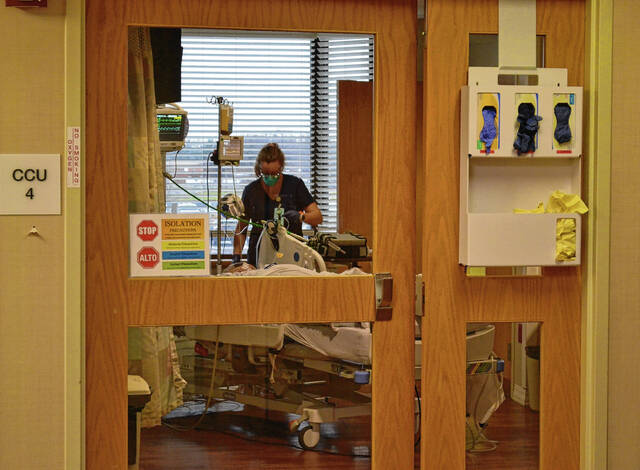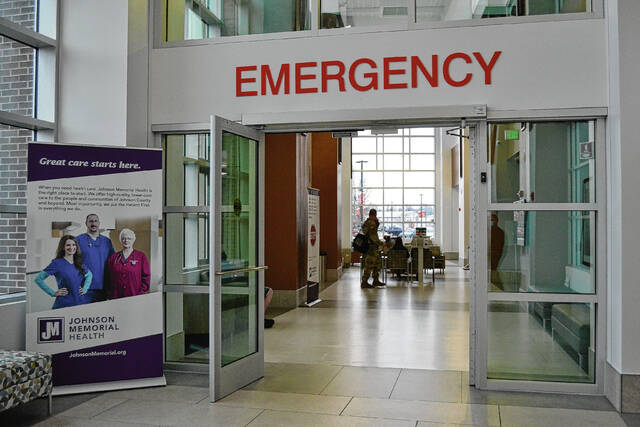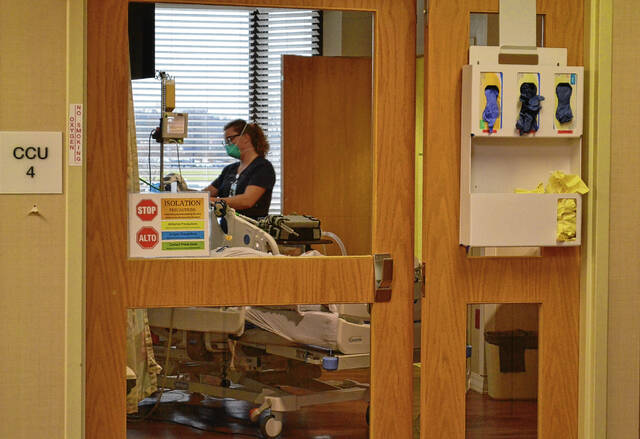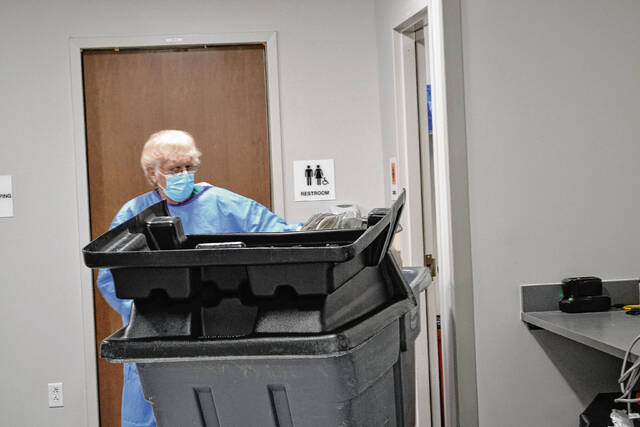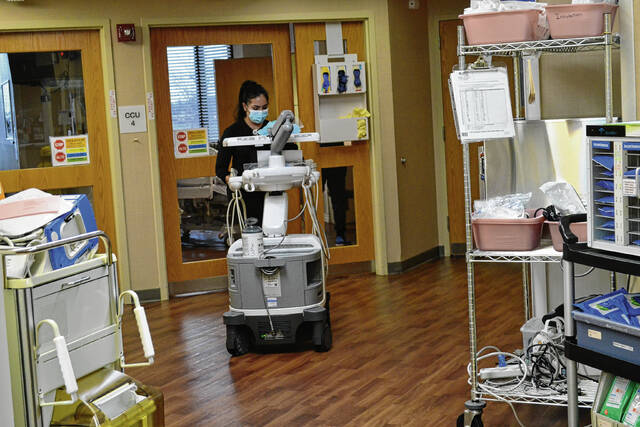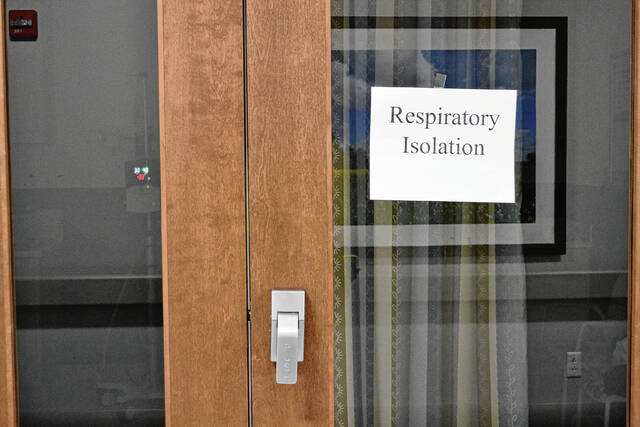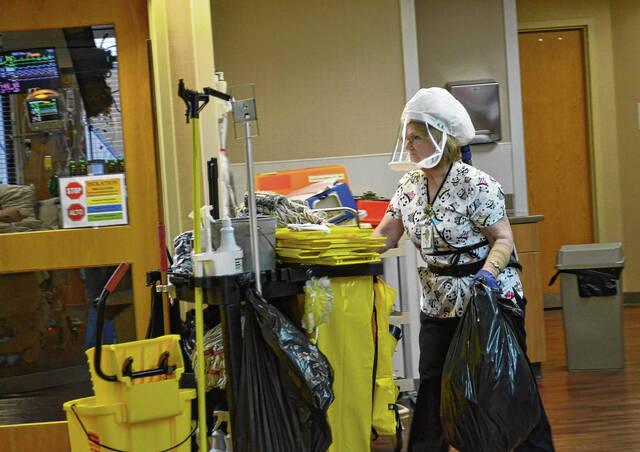The situation is worse than it has ever been.
Hospitals around the state are strained due to a combination of COVID-19, typical winter illnesses and routine patient care. Locally, hospitals have long waits for a bed and are on extended diversions, officials say.
Seventeen patients were waiting for a bed Wednesday morning in Johnson Memorial Hospital’s emergency room, while 11 unvaccinated COVID patients occupied beds. Six of the 11 COVID-19 patients were on ventilators, said Dr. David Dunkle, president and CEO.
“Every day it is chaos. It is putting out a fire. It is hoping one of your nurses doesn’t get sick,” Dunkle said. “We are seeing increased volumes. We are seeing people get care for an extended period of time in the emergency department, and that is not what it is designed to do.”
Johnson Memorial has been off diversion for just a few hours in the past five days. The hospital’s bed shortage is so severe, some patients waiting in the emergency room have been there for days, one for at least 50 hours, he said.
“Conditions are quickly deteriorating to the worst that I have seen for JMH during the entire pandemic,” Dunkle said.
That’s worse than during the delta surge this past summer, when the hospital treated 25 COVID-19 patients twice in the same week.
Johnson Memorial is full, and hospital administrators are dealing with the most staff absences they’ve had during the pandemic. COVID-19 and other illnesses have many staff members staying home because they’re sick or have to care for loved ones, Dunkle said.
The county hospital is one of about a dozen hospitals that are getting help from the Indiana National Guard. Two medics and four general-purpose personnel are helping out for the next two weeks, with a possible extension for two more depending on conditions at the time, he said.
The medics will help staff by taking vital signs, giving medications, drawing blood and other tasks they are able to do within the parameters of their medical license. Other personnel will help out in non-medical areas that are also short-staffed, Dunkle said.
Though those six soldiers won’t solve the staffing shortage, they’re providing the hospital a life raft during an increasingly dire situation, he said.
“As a medical professional, you pride yourself on providing the highest quality of care,” Dunkle said. “You realize that is getting harder and harder to do with our strained system.”
Genomic sequencing the state conducted recently indicates the delta variant is still the dominant strain in Indiana, but state health officials said that won’t last long.
There are multiple factors that indicate the situation will get worse before it gets better, said Dr. Kris Box, state health commissioner, during a Wednesday news conference. More people under age 40 are ending up in the hospital and the percentage of kids with a severe illness has increased to 10%, according to the Indiana Department of Health.
The statewide positivity rate, at 14%, is back to the high seen last winter, and hospitalizations are now higher than at any point during the pandemic, Box said.
As more are getting tested for the virus, the state’s testing supply is short. Rapid tests at local health department sites are reserved for essential personnel and students due to a national shortage. The state has a guarantee of at least 11,000 tests, but is working with other suppliers to get more, she said.
People needing a test may have to take a PCR test, which takes about 48 hours to get results. While symptomatic patients wait for tests and test results, they should isolate at home, Box said.
Hospital censuses right now and since April are higher than they have been in five years, said Dr. Lindsay Weaver, state medical officer, during the news conference.
Hospital censuses are high for a number of reasons, but Dunkle says the unvaccinated are the clear reason for Johnson Memorial’s backlog of patients. Just over half of eligible Hoosiers are vaccinated, and 60.4% of Johnson County residents are vaccinated.
Weaver, Box and Gov. Eric Holcomb on Wednesday asked Hoosiers to do more to slow the spread of the virus. Though there is no return to a statewide mask mandate, and no calls for local officials to revisit restrictions, they urged Hoosiers to get vaccinated, boosted and be vaccine advocates among their families and peers.
“If you’re gotten a vaccine and booster, that’s not all you can do,” Holcomb said during the news conference. “You can appeal to those people who are unvaccinated. You might be the one they trust, who they will listen to.”
Weaver warned that a prior infection is not enough to avoid another infection. More than 1,800 reinfections have occurred this month in Indiana, including 680 reported on Wednesday alone.


